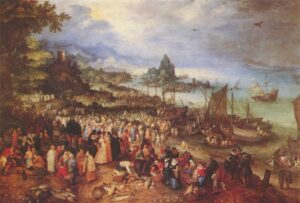4th Sunday after Pentecost
In today’s Gospel, we contemplate Our Blessed Lord in Simon Peter’s boat, preaching to the people on the shore. At the end of His teaching, Jesus gives to Peter alone the command: launch out into the deep. Peter replies that they have spent the whole night fishing and have found nothing. Nevertheless, in obedience to the Lord’s command, he does as he is told, and lo and behold, his obedience is blessed: a huge catch of fish is ready to be taken in.

This miracle was Our Lord’s way of foretelling by deeds instead of words the conversion of souls that would come about by means of the apostolic preaching. The apostles, the priests alone, are sent out to preach the Gospel. Henceforth, they will be catchers, not of fish, but of men, that is to say, of the souls of men, drawing them out of the deep waters of this miserable world and its vices into the promised land of divine grace and ultimately, if they persevere, to eternal life.
What exactly is meant by the deep? What is deep is far from the surface; it is not readily seen or attained; it remains hidden until one actually makes one’s way there, and this requires great effort and sometimes great peril and fatigue.
The human heart is a deep well, as Our Lord helped the Samaritan woman to see (John ch. 4). We humans are good at hiding things from others, but much better at hiding things from ourselves; and yet, deep down in our heart, there is, alongside a certain indifference to the things of God, a deep desire for Him. There is a longing for God in each human heart because each of us is made for God and can only find peace and fulfilment in Him.
One of the main concerns of the true apostle is to help souls connect with the depth of their own hearts. So many people live on the surface of life. They float along from distraction to distraction, from pleasure to pleasure, from ambition to ambition, and because of this, they lose the true relish of life. Life becomes boring for most people because we are meant for something higher that most never even suspect, let alone reach. Most people refuse to enter their hearts because they are afraid of what they will find there. They do not want the hard work of self-discipline and examination of conscience. They fear the consequences of such introspection, and so their lives remain those of sophisticated animals. They live in nice houses and wear comfortable clothes; they may have very keen intellects to pursue the knowledge of things that please them, but at the end of the day, they are little better than animals. There is no life, no grace, no future. They never find God, because they do not go looking for Him, and yet He is right there in the depths of their own heart. Such is the state of the immense majority of mankind.
Another way of looking at the deep is to see in it the depth of God, the abyss of His Being, the ocean of His grace and love. On the feast of the Holy Trinity, we were reminded that God is an Immensity in which we are called to lose ourselves. But it is not like the immensity of worldly things that scatter us in various directions, but rather like the infinite ocean of goodness and holiness into which we can be plunged, and into which, like fish delving deeper into the ocean, we find greater and greater fulfilment and peace.
Similarly, on the feast of the Sacred Heart, we were reminded that His thoughts are from all eternity, ever seeking to save us from our sins and show us mercy. He is never oblivious of us and our needs. At every moment, He is sending us graces to not be superficial, but to help us enter into ourselves, into the depth of our heart, where He is waiting for us. We can be reminded here of St Augustine’s famous words, after his long search for God in the wrong places: “I was seeking You on the outside, but You were on the inside”… “You were more intimate to me than I am to myself” (cf. Confessions).

The problem is this: most people simply cannot be bothered to make the effort involved in a serious interior life. Like any relationship, getting to know God takes time and effort. One must intentionally spend time with Him, with His Word, before the Blessed Sacrament, and seek Him day and night. One must know how to set one’s priorities aright. All this is part of putting out into the deep.
Perhaps this is the reason why in today’s epistle, St Paul tells us: For I reckon that the sufferings of this time are not worthy to be compared with the glory to come that shall be revealed in us (Rm 8:18). In other words, effort is involved. Yes, suffering is a significant part of the program for those who are serious about prayer and the interior life, seeking to avoid sin and progress in intimacy with God – in a word, to save their soul and become a saint. There are no quick fixes or fast lanes to sanctity. There is only the day-to-day toil of spending time with God, even when we don’t feel like it. Sometimes we are consoled and strengthened to move forward, but most of the time we feel like we are lost in the depths of an ocean we cannot possibly fathom. And that is a good thing, for we are small and we are weak and we are needy. It is good to feel that smallness and neediness and want, for only then do we take the plunge into the Godhead, who alone can heal and transform us.
We are very much like the faithful of Laodicea to whom Our Lord addressed these words: Thou sayest: I am rich and made wealthy and have need of nothing: and knowest not that thou art wretched and miserable and poor and blind and naked. I counsel thee to buy of me gold, fire tried, that thou mayest be made rich and mayest be clothed in white garments: and that the shame of thy nakedness may not appear. And anoint thy eyes with eyesalve, that thou mayest see. Such as I love, I rebuke and chastise. Be zealous therefore and do penance. Behold, I stand at the gate and knock. If any man shall hear my voice and open to me the door, I will come in to him and will sup with him: and he with me. To him that shall overcome, I will give to sit with me in my throne: as I also have overcome and am set down with my Father in his throne (Apoc 3:17-21).
Our daily fidelity to prayer is the time we open to Him so that He can dine with us. Sadly, most people leave Him outside. Let us not be among those.


